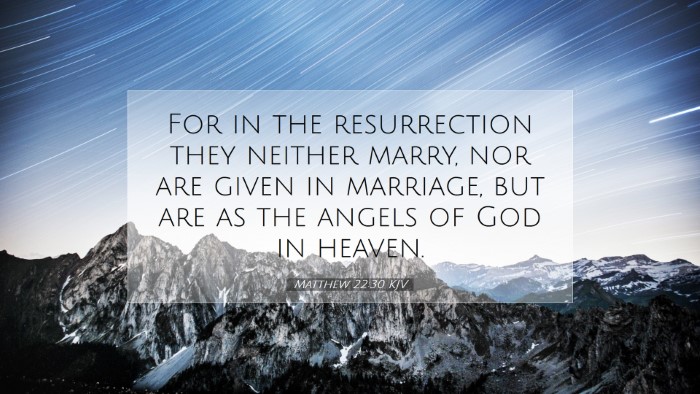Bible Commentary on Matthew 22:30
Verse: "For in the resurrection they neither marry, nor are given in marriage, but are as the angels of God in heaven." (Matthew 22:30)
Introduction
This verse occurs in the context of a confrontation between Jesus and the Sadducees, a group that denied the resurrection. Their question aimed to challenge Jesus' teaching on life after death. In response, Jesus not only affirms the reality of the resurrection but also offers profound insight into the nature of relationships in the age to come. Public domain commentaries, such as those from Matthew Henry, Albert Barnes, and Adam Clarke, provide rich theological reflections on this passage.
Contextual Background
The verses leading up to Matthew 22:30 set the stage for the Sadducees' inquiry regarding the resurrection. They present a hypothetical scenario involving a woman who married seven brothers, each of whom died in succession. Their question culminates in a challenge: "Whose wife shall she be in the resurrection?" This query, rooted in their legalistic understanding of the Law of Moses, reveals their skepticism about life after death and the resurrection.
Matthew Henry comments on how the Sadducees' question reflects a common misunderstanding: they assume that the life to come will merely replicate earthly conditions. By doing so, they fail to grasp the transformative nature of resurrection life as elucidated by Jesus.
The Nature of Resurrection
The key message in Matthew 22:30 highlights that in the resurrection, earthly institutions such as marriage will not exist in the same capacity they do now. According to Adam Clarke, this statement emphasizes the distinction between earthly life and eternal life. Clarke notes that relationships in heaven will be characterized by a different essence, one that is wholly focused on divine glory rather than human relational structures.
Albert Barnes reinforces this view by explaining the implications of being "as the angels of God in heaven." He suggests that the absence of marriage in the resurrection indicates a fulfillment of purpose that transcends earthly ties. Relationships will not diminish in value but will be expressed in perfected spiritual fellowship with God and one another.
Theological Implications
The notion of being "as the angels" introduces several theological insights regarding the nature of our resurrected existence.
- Transformation: As believers, we will experience a transformation that aligns us with the divine nature.
- Spiritual Union: Our communion with God will be our primary focus, surpassing earthly relationships.
- Community of Saints: We will exist in a perfected community of believers, showcasing unity and love without the need for marriage.
Henry also emphasizes the concept of eternal life involving a closer relationship with God, who is our ultimate source of joy and fulfillment. This insight invites believers to re-evaluate their understanding of relationships in light of God's eternal plan.
Practical Applications
The teaching found in Matthew 22:30 serves as a profound reminder for pastors, students, and scholars regarding the nature of earthly relationships compared to eternal relationships.
- Understanding Our Future Hope: Embrace the truth of eternal life, realizing that our earthly ties serve as a temporary shadow of the true spiritual realities to come.
- Elevation of Spiritual Relationships: Prioritize relationships that reflect God's kingdom values, promoting unity and love among believers.
- Encouragement in Grief: For those mourning lost loved ones, this passage offers comfort, affirming that believers will be together in a transformed existence, free from the pains of this world.
The nature of this verse encourages believers to invest in spiritual growth and community, pointing towards a future climax of fellowship that remains unbroken in God's presence.
Conclusion
In conclusion, Matthew 22:30 invites us into deeper theological reflection on the nature of resurrection and eternal life. The insights from various public domain commentators synthesize to reveal that the resurrection transforms our understanding of human relationships and establishes a new reality rooted in divine communion. As we engage with this passage, we are called to live with an eternal perspective that shapes how we relate to one another and ultimately prepares us for our future with God.


